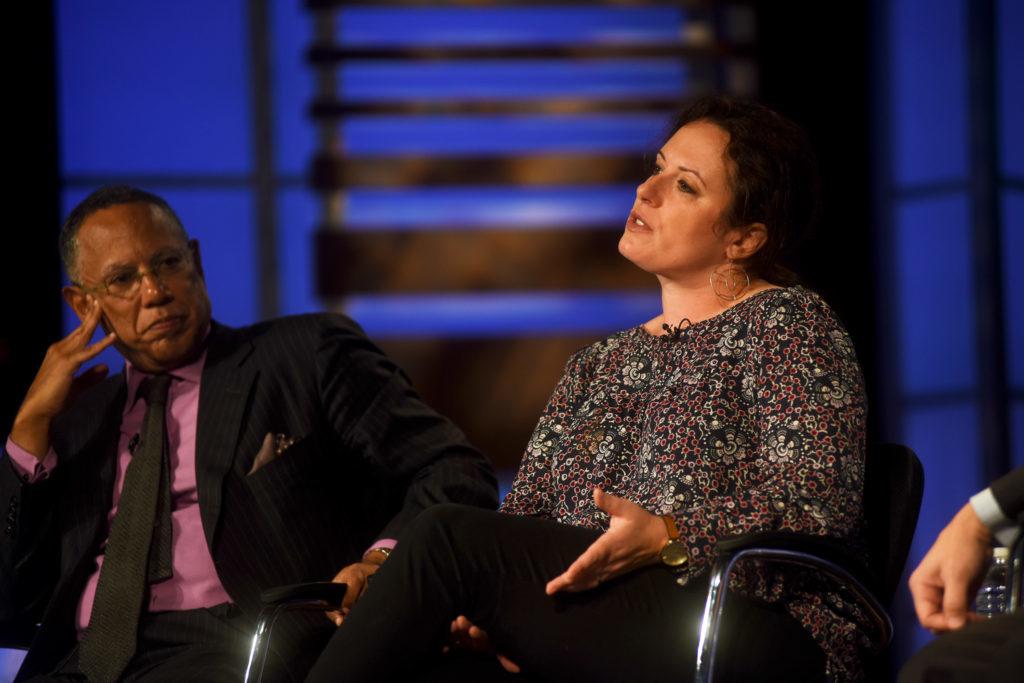Journalists from The New York Times discussed the challenges of covering President Donald Trump and withstanding attacks on the media at a panel discussion in Jack Morton Auditorium Thursday.
Jim Rutenberg, a media columnist for the Times, moderated a discussion with Executive Editor Dean Baquet and White House correspondents Maggie Haberman and Peter Baker, covering everything from freedom of the press in today’s fraught political environment to the importance of covering the presidency.
At the event, part of the “TimesTalks” series hosted by the news organization, panelists discussed journalistic practices and their time behind the scenes covering the Trump White House.
Here are three key points from the discussion:
Freedom of the Press
The panel opened the event with a discussion about Trump’s remark Wednesday that it’s “disgusting the way the press is able to write whatever they want.”
Baquet said that while the comment wasn’t surprising, he wasn’t sure if any other president would have condemned the press so “clearly and publicly.”
“I’m not sure I’ve seen someone so vocally challenge the press’ right to cover in the world,” he said.
Later, Trump tweeted that network news outlets’ licenses should be challenged and revoked for producing “partisan, distorted and fake” information, though networks don’t have licenses – only individual affiliates do.
Baker said the most important job of a journalist is to ensure that facts are “airtight” and he said while Trump may have genuine grievances against the press, the attacks are often part of an appeal to his conservative base.
“The name-calling is part of the shtick – it’s the environment and surround sound of this presidency,” he said. “It’s fine – we’re big boys and big girls and we can take it. What would be disturbing is if that then trails into actual changes in our ability to do our jobs.”
The Twitter impact
The three speakers agreed that Twitter can negatively impact the way that journalists cover Trump’s administration.
Haberman said that as journalists too often shift to “telling, not showing” in the Trump era, comments on Twitter can exacerbate Trump’s opposition to the press.
“He has a legitimate complaint with the broad coverage,” she said. “A lot of it is compounded by Twitter, and I think that the tone is not helpful at times, and Twitter is just pouring acid on that.”
But while the panelists criticized increasingly editorial tweets from reporters, they defended coverage of Trump’s posts because they are often newsworthy statements that offer a real-time glimpse into the president’s mindset.
“For the people who say they’re not stories – why wouldn’t you want to know what he’s thinking?” Haberman said.
Baker added that, at least from the Twitter aspect, Trump’s administration is the most transparent in American history and that “it’s like they’re playing the Nixon tapes every night on the evening news.”
Covering Trump
A question sent in on the Times’ Facebook Live page asked what Trump would do if the press didn’t cover him.
“He would be President of the United States,” Baker said. “If the New York Times didn’t cover him, the millions of people retweeting him suddenly wouldn’t pay attention or care?”
Baquet said he separates himself as a journalist, and as the person in charge of The Times’ coverage, into two roles: one who questions Trump’s criticisms of his profession and one who reports about Trump’s actions.
“As somebody who is responsible for covering him, I have a different role, which is to just cover him and cover him aggressively with fairness,” he said.





